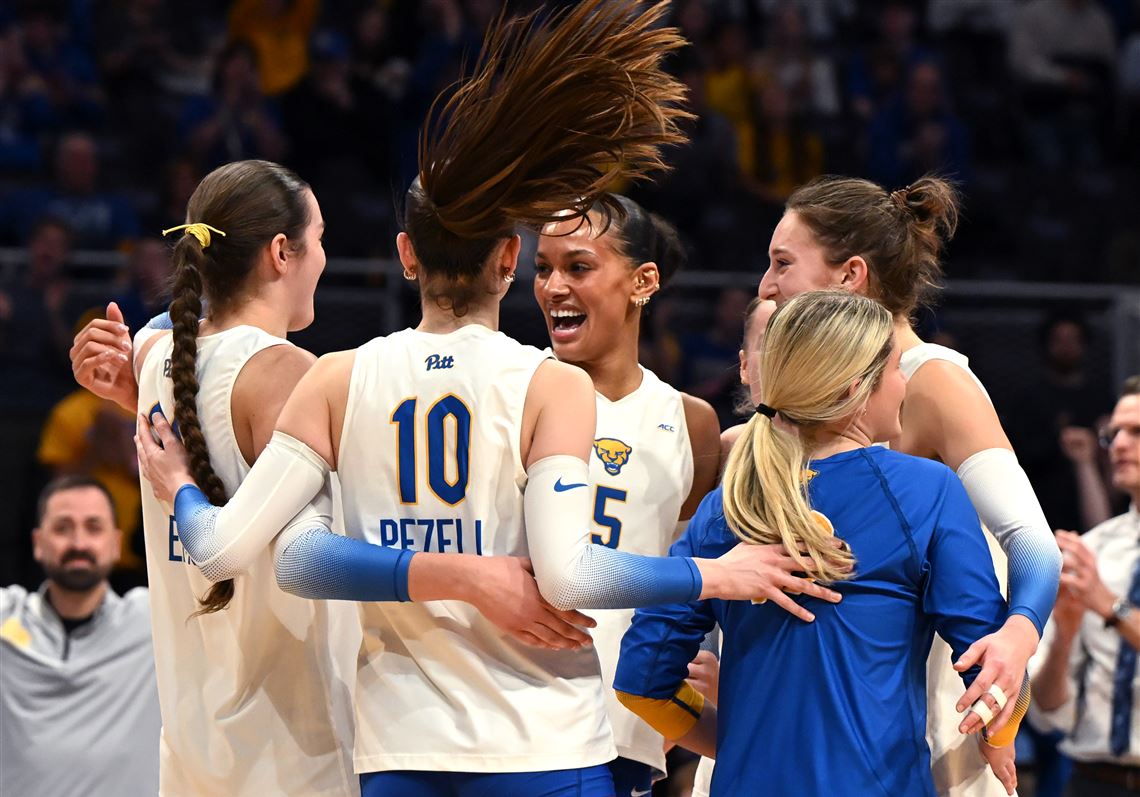Sports
Why Social Media Might Be Making You Slower
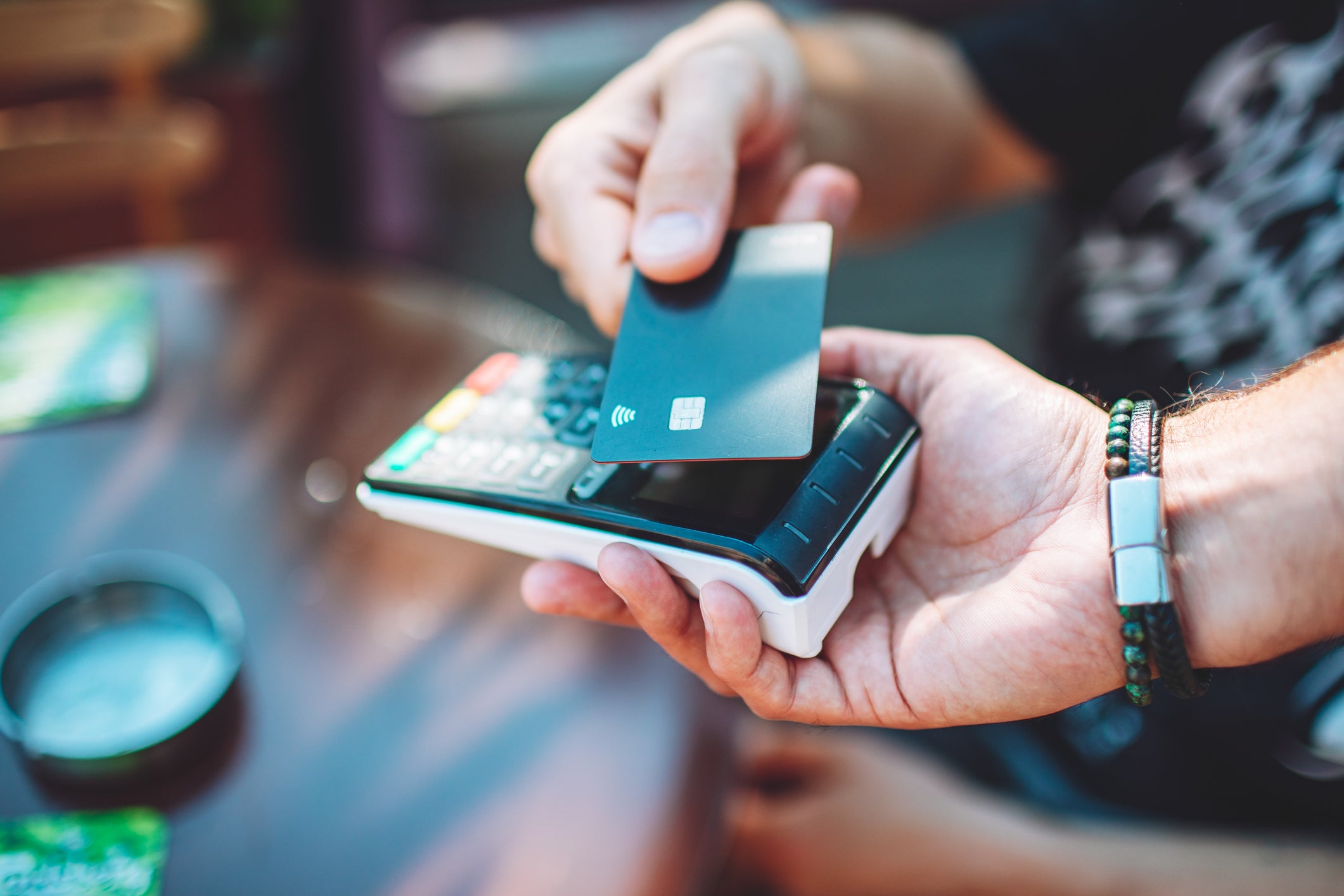
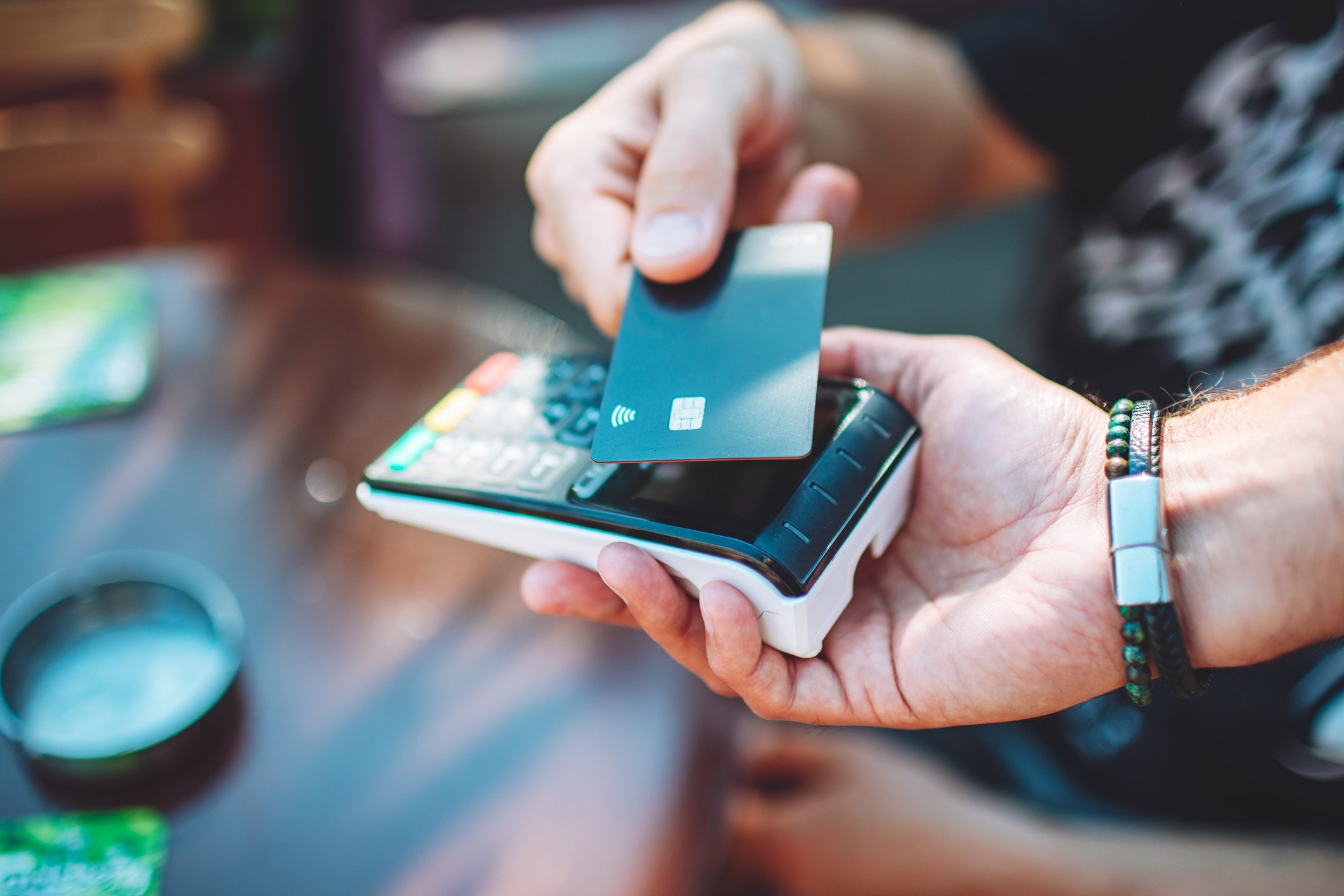
As headlines go, “Social Media is Bad” doesn’t raise many eyebrows these days. TikTok and its ilk are said to be harming mental health, stifling creativity, eroding privacy, fueling disinformation, undermining national security, and so on. These are all big issues worthy of careful debate. But there’s a narrower and more tangible risk that Sweat Science readers might be concerned about. What if social media is making us slower?
A recent study in the European Journal of Sport Science, from Carlos Freitas-Junior of the Federal University of Paraiba in Brazil and his colleagues, presents data on what happens when athletes scroll on their phones before training sessions. Surprisingly, it doesn’t just mess with that specific workout. Instead, over time, the athletes make smaller gains in performance. The findings tell us something about social media—and they also suggest that the benefits of a workout may depend in part on the state of mind you’re in while doing it.
The Problem(s) With Social Media
Several studies over the years have examined social media use in athletes. Most famously, back in 2019 researchers at Stony Brook University found an association between late-night tweeting (as it was then called) and next-day game performance in NBA players. If the players were tweeting after 11:00 P.M., the players tended to score fewer points, grab fewer rebounds, and shoot less accurately the next day.
You might argue—correctly—that the problem here is sleep deprivation rather than social media. But other studies have found direct links between the usage of apps such as TikTok and sleep patterns in young athletes, suggesting that the root of the problem is the apps. Researchers have also linked social media use to mental well-being and even eating disorders in athletes, both of which impact performance.
These indirect impacts aren’t always straightforward: the TikTok-hurts-sleep study also found that Instagram usage was associated with greater calmness, for example. But there’s also a more immediate concern, which is that social media apps leave you mentally fatigued, which in turn directly compromises your endurance and decision-making abilities.
The Mental Fatigue Debate
The study that kicked off the modern conversation about mental fatigue in sport was a 2009 experiment from a researcher named Samuele Marcora. He showed that 90 minutes of doing a cognitively challenging computer task reduced cycling endurance by about 15 percent compared to spending 90 minutes watching a documentary.
More studies followed, each investigating different types of mental fatigue and their effects on different types of athletic performance. Many of them echoed Marcora’s original results, but not all of them. One of the big unresolved questions is the extent to which the findings apply in real life. If you have to write an exam or do your taxes right before you run a marathon, that’s probably bad news. But what about the normal activities we engage in on a daily basis—like scrolling through the social media apps on your phones? Do they induce sufficient mental fatigue to affect performance?
Back in 2021, a swimming study found that 30 minutes of social media use hurt athletes’ times in 100- and 200-meter freestyle trials, but not in the 50 meters. Another study found that boxers made worse decisions after using social media, but that their jumping performance was unaffected. Yet another found no effect of social media use on strength training performance. These results are consistent with the general pattern of research on mental fatigue and related stressors like sleep deprivation: with sufficient motivation, you can still exert maximal force, but your decision-making and endurance may be compromised.
What the New Data Shows
Freitas-Junior’s new study looks at volleyball players, testing their jumping performance and their “attack efficiency,” a measure of how hard and how accurately they can hit the ball in a sequence of attacks. What’s different about the study is that it looked at long-term rather than immediate effects. Fourteen athletes spent half an hour before practice either using Facebook, WhatsApp, and Instagram on their phones, or watching documentaries about the history of the Olympics. After three weeks, their performance was assessed and then they switched groups and repeated the process for another three weeks.
At the end of the three-week period, jumping performance wasn’t affected under either condition, but athletes’ attack efficiency was worse following the three weeks of social media use. The difference was statistically significant, but to be honest the data isn’t very convincing.
For starters, take a look at the mental fatigue data. This shows how much, on average, mental fatigue (on the vertical axis) increased after watching the documentary (DOC) or using social media (SMA):
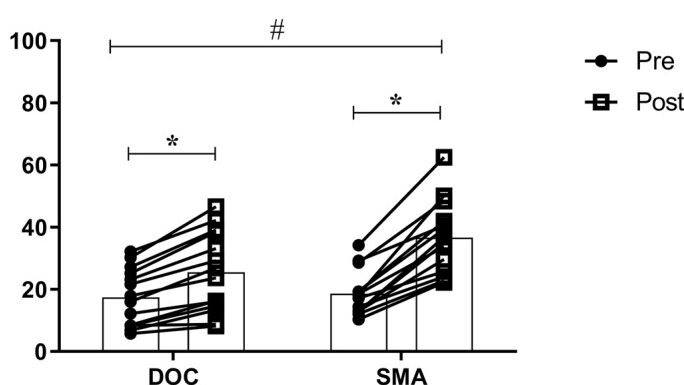
Athletes’ mental fatigue before and after watching a documentary, and before and after social media use (Illustration: European Journal of Sports Medicine)
This is nice clean data. Watching the documentary increased the subjective perception of mental fatigue in almost every individual. Using social media increased it even more, again with uniform results in all the individuals. We can say with confidence that social media use increases mental fatigue compared to chilling with a doc.
Now take a look at the attack efficiency data, measured in arbitrary units where a higher number is better:
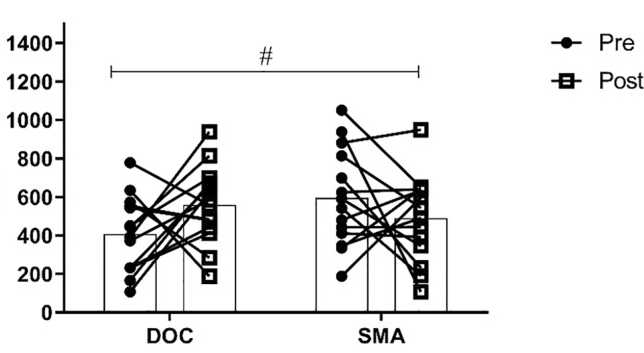
This time the individual data is all over the map. The statistical analysis tells us that, on average, the social media group got worse while the documentary group got better. This average effect may or may not be real—only more and larger studies can confirm if it is. Based on the body of previous research, I’d guess that it’s probably real. But the pattern is so inconsistent on an individual level that I’d hesitate to use it as a basis for advice to athletes. Some athletes got better after social media use. That might be a fluke, or it might indicate that they have a healthier relationship with their apps such that a little phone time before practice gets them in a better headspace.
In the end, then, the narrative isn’t as tidy as we might like. It’s not that social media is uniformly bad, will leave you mentally fatigued, and will automatically rob you of training gains. There’s still a valuable message here, though. The things we do—social media, yes, but also real-world socializing, reading a book, listening to music, working, commuting, daydreaming, and so on—affect our mental state and readiness to perform. We all respond to these things differently, so there’s no universal list of dos and don’ts. But it’s worth figuring out what gets you in the right headspace and leaves you mentally energized, so that you can replicate it when it matters.
Sports
Cincinnati Enquirer names 2025 girls volleyball all-city teams
Updated Dec. 10, 2025, 8:20 p.m. ET
The 2025 high school girls volleyball season brought two state championships to Cincinnati and a state runner-up to Northern Kentucky.
But more than that, the action on the court each night showcased some of the best talent each state had to offer.
Here are The Enquirer’s 2025 all-city teams for each division in Ohio, plus Northern Kentucky and Indiana.
Sports
Pitt volleyball to host 2026 Opening Spike Classic
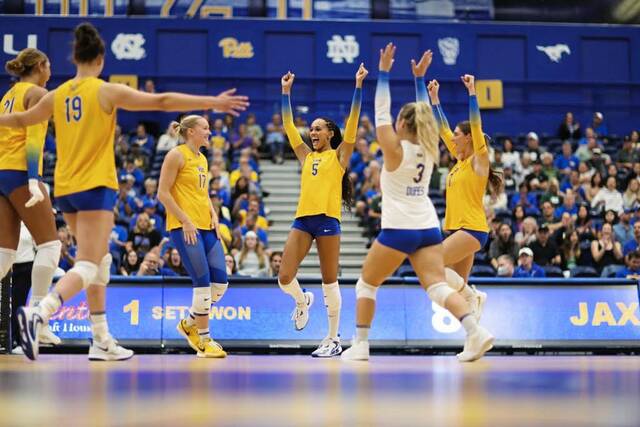
Pitt volleyball will begin the 2026 campaign with two major tests, as the Panthers were announced as hosts for the Opening Spike Classic, featuring matchups against Kansas and Wisconsin.
The two-day event at Petersen Events Center will be televised nationally on ESPN and see Pitt play the Jayhawks Aug. 28 and Badgers on Aug. 30. Stanford and Wisconsin also play on the event’s first day, followed by the Jayhawks vs. the Cardinal on Day 2.
The Opening Spike Classic debuted last season with the Badgers playing host to matches featuring Kansas, Creighton and Texas.
“We’re excited to kick off opening weekend by hosting three of the best teams in the country,” Pitt coach Dan Fisher said in statement. “Fans can look forward to high-level volleyball right here in Pittsburgh. If we want to be the best, we have to play the best, and we’re doing that right away.”
The No. 1-seeded Panthers (28-4, 18-2 ACC) host No. 4 Minnesota at 7 p.m. Thursday in the NCAA Tournament regional semifinals.
A win over the Gophers would propel the Panthers, who have advanced to the Final Four for the last four consecutive seasons, to the Elite 8, where they’d face the winner of the regional semifinal match between No. 2 SMU and No. 3 Purdue.
Next year’s Opening Spike Classic participants — Stanford, Kansas and Wisconsin — are all also currently competing for a national title.
No. 4 Kansas faces No. 1 Nebraska on Friday night, while No. 2 Stanford and No. 3 Wisconsin square off in the afternoon.
The Opening Spike Classic is organized by PlayFly Sports in collaboration with JMI Sports, exclusive multimedia rights holder for Pitt Athletics.
“We are thrilled to be bringing this event back for a second year and to build on the momentum we created with the event launch last year,” said Michael Neuman, co-head of Playfly Sports Consulting. “The Opening Spike Classic is a celebration of women’s achievements in sports, and there is no better way to recognize that than by bringing together these top college volleyball teams to compete.”
Justin Guerriero is a TribLive reporter covering the Penguins, Pirates and college sports. A Pittsburgh native, he is a Central Catholic and University of Colorado graduate. He joined the Trib in 2022 after covering the Colorado Buffaloes for Rivals and freelancing for the Denver Post. He can be reached at jguerriero@triblive.com.
Sports
Nebraska Huskers Dominate All-Region Volleyball Honors
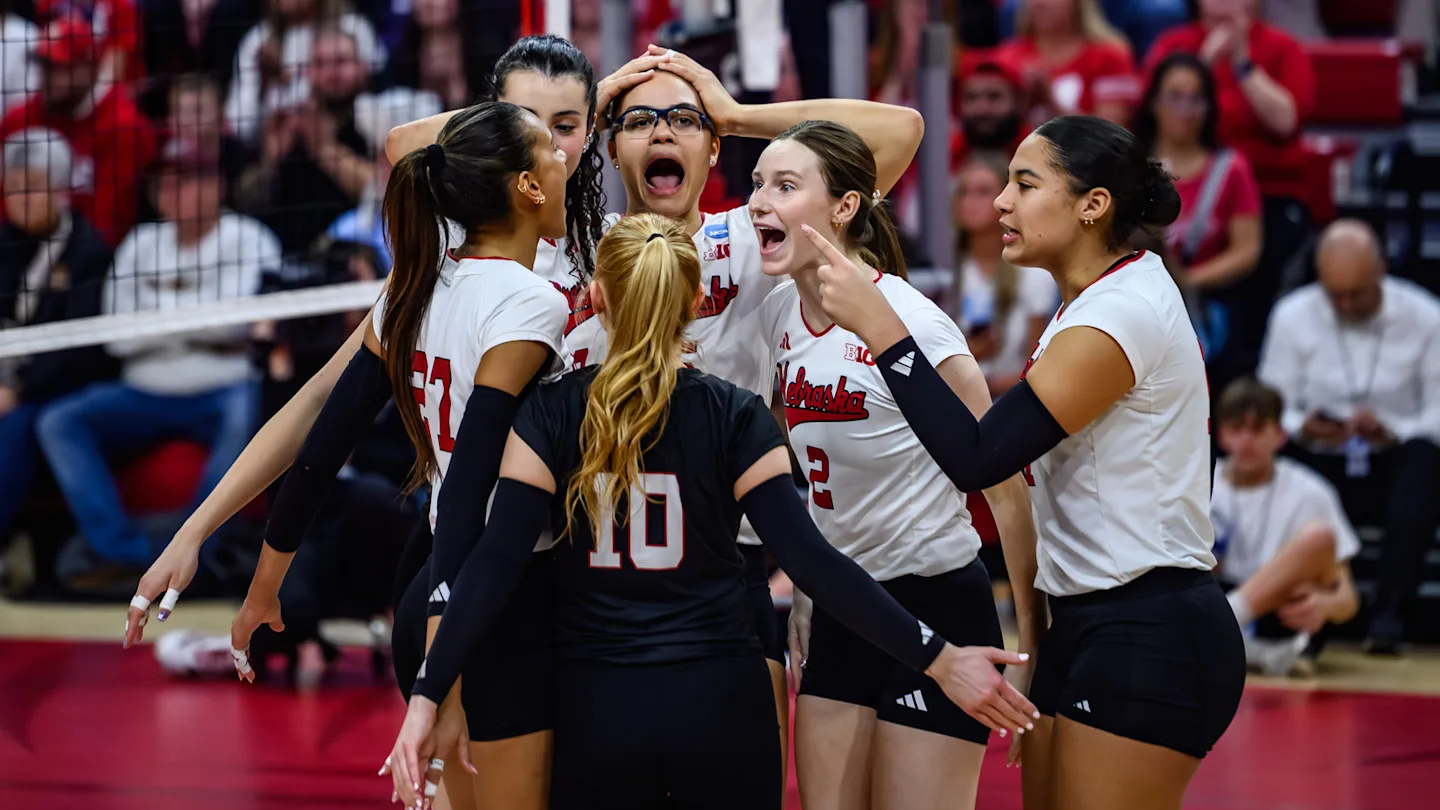
Nebraska is once again taking the collegiate volleyball world by storm, entering the 2025 NCAA Tournament as the No. 1 overall seed. So it’s no surprise the Huskers dominated some of the sport’s top honors announced on Tuesday.
AVCA West All-Region Team
Bergen Reilly

Junior setter Bergen Reilly showcased Nebraska’s excellence on multiple levels. She was one of five Huskers named to the AVCA West All-Region Team, which is an impressive accomplishment on its own. This marks her third straight year earning All-Region recognition, and she has continued her high-level play this season. Thanks in part to Reilly’s elite setting, Nebraska is on track to break the single-season school record with a .353 team hitting percentage. That mark leads the nation and is the best posted by any Big Ten team since Penn State in 2009.
This set is ridiculous. Happened in Nebraska’s season opener in August. Turned out to be a sign of what was to come during Bergen Reilly’s junior campaign.
She’s the 2025 Big Ten Player of the Year & Setter of the Year. #Huskers @BergenReilly @1011_News pic.twitter.com/8EJTVkwMji
— Kevin Sjuts (@kevinsjuts) December 3, 2025
Reilly’s standout season did not end there. She was also named the AVCA West Region Player of the Year, becoming the fourth Husker and the third in a row to earn the honor, joining Kelly Hunter (2017), Merritt Beason (2023) and Lexi Rodriguez (2024). She continues to collect accolades this season as the 2025 Big Ten Setter of the Year and a First-Team All-Big Ten selection. She also earned the 2025 Big Ten Volleyball Player of the Year, the first time she has received that award.
Rebekah Allick

Senior middle blocker Rebekah Allick is putting together one of the strongest seasons of her Husker career. She continues to be a reliable presence on both sides of the net, contributing efficient offense while anchoring Nebraska’s front-row defense. Her play earned her All-Big Ten First Team honors for the first time, a deserved recognition after years of consistent contributions.
POWER from Rebekah Allick.
📺: ESPN+ x @HuskerVB pic.twitter.com/PLd7Dn9UQk
— Big Ten Volleyball (@B1GVolleyball) December 6, 2025
Allick has also climbed into rare company in the program’s rally-scoring era. With 536 career blocks, she now ranks fifth all-time at Nebraska, a mark that also places her fifth among active Division I players. Her presence at the net has been a integral part of Nebraska’s identity this season, and she continues to rise to the moment when it matters most.
Laney Choboy

Junior libero Laney Choboy has been the steady heartbeat of Nebraska’s backcourt all season. She’s the one holding things down defensively, reading attacks and keeping rallies alive with the kind of confidence and toughness every championship team needs. Her efforts earned her a spot on the All-Big Ten Second Team.
Relive all of Laney Choboy’s great saves on this play 🤯
📺: FS1 pic.twitter.com/6rI7zxaMjR
— Big Ten Volleyball (@B1GVolleyball) November 7, 2025
Choboy has already totaled 276 digs on the year and counting, a testament to just how reliable she is in big moments. She’s delivered several standout performances, including a career-best 20 digs against Illinois and another strong night with 15 at Minnesota. When the Huskers need a spark on defense, she’s almost always the one providing it.
Andi Jackson

Junior middle blocker Andi Jackson has been one of Nebraska’s most consistent and explosive attackers this season. She continues to elevate her game year after year, earning All-Big Ten First Team honors for the second consecutive season.
ANDI. FREAKING. JACKSON.
ARE YOU KIDDING????? 🤭🤭🤭🤭
🎥: ESPN+ pic.twitter.com/U4rR21nfcu
— Nebraska Volleyball (@HuskerVB) December 6, 2025
Jackson has also established herself as one of the most efficient hitters in the country. Her hitting percentage not only leads the nation but also stands as the best single-season mark in Nebraska volleyball history. Combined with her reliable performance at the net defensively, Jackson has become a foundational piece of the Huskers’ success.
Harper Murray

Junior outside hitter Harper Murray has emerged as one of Nebraska’s top offensive threats this season, setting career highs with 3.51 kills per set and a .299 hitting percentage. Her strong play earned her All-Big Ten First Team honors for the first time.
HARPER MURRAY ISN’T PLAYING AROUND 🤫#NCAAWVB x 🎥 ESPNU / @HuskerVB pic.twitter.com/qy97P7nUn2
— NCAA Women’s Volleyball (@NCAAVolleyball) December 10, 2023
Murray contributes in every phase of the game. She averages 2.14 digs per set, leads the team with 30 aces, and adds 58 blocks, giving her a team-leading 4.16 points per set. Her all-around skill and steady production make her a key piece of the Huskers’ success.
Honorable Mention
Virginia Adriano

Freshman opposite hitter Virginia Adriano is already giving a glimpse of Nebraska’s future, earning a spot on the Big Ten All-Freshman Team in her debut season. Originally from Turin, Italy, Adriano has quickly made an impact on both sides of the net, averaging 2.20 kills per set with a .284 hitting percentage, along with 0.66 blocks per set and 14 service aces.
You can hear the force when Virginia Adriano makes contact with the. ball 😳
📺: Big Ten Network pic.twitter.com/zz1nBAMbVR
— Big Ten Volleyball (@B1GVolleyball) September 7, 2025
She has risen to the occasion in conference matches as well, contributing 2.34 kills per set with a .318 hitting percentage. Beyond her on-court contributions, Adriano’s presence shows the growing opportunities for international athletes in college volleyball, opening doors for future players from around the world. Her all-around play and poise as a freshman indicate she will be a major contributor for the Huskers for years to come.
Taylor Landfair

Senior outside hitter Taylor Landfair has been a key player for Nebraska this season, hitting a career-best .316 and averaging 2.09 kills per set, which earned her All-Big Ten Second Team honors.
TAYLOR. LANDFAIR.
THAT’S THE TWEET. #GBR pic.twitter.com/eHPbCZmucI
— Nebraska Volleyball (@HuskerVB) November 15, 2025
Landfair’s impact goes beyond this season. She was a 2022 AVCA All-American and has appeared in the most career matches of any active Division I player, with 151 contests. She also ranks 20th among active Division I players with 1,517 career kills, reflecting her consistency and durability throughout her Husker career.
Head Coach

The players can only go as far as their head coach allows, and Nebraska head coach Kelly Busboom has given them every opportunity to flourish. Busboom was honored as the AVCA West Region Coach of the Year.
In her first year at the helm, Busboom led the Huskers to a perfect 30-0 regular-season record, including a 20-0 mark in Big Ten competition. Her debut earned her AVCA West Region Coach of the Year honors and the Big Ten Coach of the Year award, making her the first coach in program history to capture a conference title in their inaugural season.
Given the dedication and performance of these players, it was clear that Busboom was the coach most deserving of such recognition.
These awards and honors are well-earned, but they also tell a bigger story. The Huskers extended their win streak to 32 with a sweep of Kansas State on Saturday, Dec. 6, in the first round of the NCAA Tournament, remaining undefeated. This team is full of talented players who understand what it takes to win.
Week after week, they perform at the highest level, delivering a masterclass in volleyball and making a definitive statement in the collegiate game. Many of these athletes are on their way to becoming Nebraska volleyball legends, leaving a lasting mark on the program.
More From Nebraska On SI
Stay up to date on all things Huskers by bookmarking Nebraska Cornhuskers On SI, subscribing to HuskerMax on YouTube, and visiting HuskerMax.com daily.
Sports
Pitt volleyball among four elite programs set for 2026 Opening Spike Classic
Sports
Three Golden Knights Named AVCA All-Americans

LEXINGTON, Ky. – The American Volleyball Coaches Association today released its 2025 AVCA All-Americans. Included in the list are three Gannon players – Bengisu Arslan (Ankara, Turkey/Private Çankaya Doga Anatolian), Lauren Atwell (Mars, Pa./Mars Area), and Sydney Wake (Massillon, Ohio/Jackson). It comes after Gannon had four honorable mention All-Americans a year ago, although all graduated.
The Golden Knights are currently in Sioux Falls, SD preparing for the NCAA Division II Elite Eight. Head coach Matt Darling‘s squad won its second straight Atlantic Regional to advance to the Elite Eight. Gannon is the number seven seed and will face No. 2 seed Concordia-St. Paul, the Central Region champion, at 2:30 p.m. on Thursday.
Makenna Nold of Concordia-St. Paul was named the AVCA Division II Player of the Year.
Arslan is now a two-time AVCA Honorable Mention All-American after previously earning the honor in 2022. The native of Ankara, Turkey was earlier named to the AVCA All-Atlantic Region team for the second time and is also a D2CCA All-Atlantic Region selection.
Gannon’s setter was chosen the PSAC West Athlete of the Year and is now a three-time All-PSAC West selection. She was a first team choice in 2022 and 2025 and was named to the second team in 2024. In addition, she was the 2022 PSAC West Freshman of the Year.
Arslan enters the Elite Eight with has 1,3759 assists, the second-highest season total. In fact, she now owns three of the top nine season assists totals, in the process boosting her career total to 4,481 assists. That is also good for second all-time. She leads the PSAC in assists per set (11.18), good for 10th in Division II.
She also stands second on the team in service aces (46) and third in digs with 298. She now has 1,140 career digs. She is tied for seventh in career service aces (175), along with seventh in sets played (457) and tied for eighth in matches played (128).
Atwell and Wake are first-time AVCA All-Americans, with Atwell the force at the net and Wake emerging as Gannon’s top hitter. Both were previously named first team AVCA All-Atlantic Region performers and second team D2CCA All-Atlantic Region selections. They were both also named to the All-PSAC West first team.
A 6-foot-3 middle blocker, Atwell leads the Golden Knights with 105 blocks, with team highs of 28 solo blocks and 77 block assists, while tied for in kills with 260. She ranks ninth in the PSAC in blocks per set. The junior also leads the team in hitting percentage at .333, good for fourth in the PSAC. She has moved up to fourth in career blocks with 365.
Wake entered her junior season with 82 career kills but the 5-foot-11 middle blocker has exploded for a team-high 347 kills and is second in hitting percentage at .298. She is also third in total blocks with 66 and fifth in digs with 133.
All three players were named to the Atlantic Regional All-Tournament Team last weekend.
Sports
Becker, Marusak and Stow Earn All-American Accolades
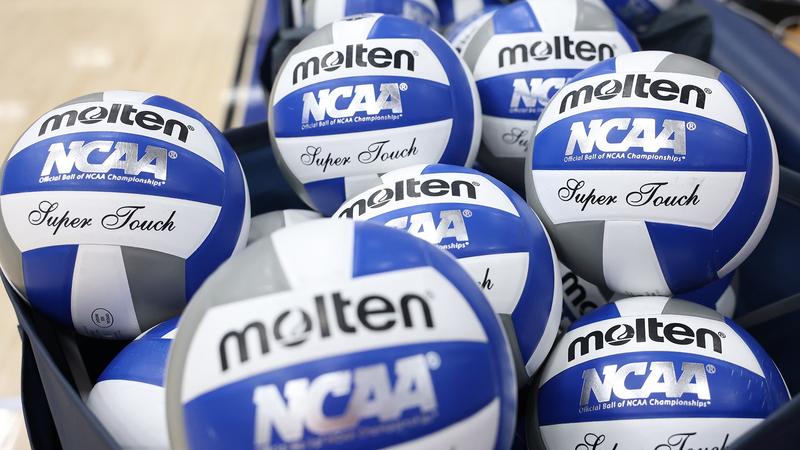
CANYON, Texas – West Texas A&M’s Emma Becker, Currie Marusak and Taytum Stow earned the highest honor a Division II volleyball student-athlete can receive on Wednesday as the trip of Lady Buffs were tabbed All-Americans.
Stow was named a Second Team honoree by the American Volleyball Coaches Association with Becker and Marusak claiming Honorable Mention accolades. Stow was also named to the D2CCA Third Team All-American squad.
Becker earned her third straight AVCA All-American honors as the Liberty Hill, Texas product registered 348 kills with a .212 attack percentage to go along with 17 assists, 10 service aces, 266 digs and 65 total blocks for a total of 396.5 points to average 3.51 per set. Becker was a First Team All-Lone Star Conference selection.
Marusak becomes the 33rd All-American in WT Volleyball history as she led the way offensively for the Lady Buffs during her senior campaign in 2025. The Amarillo High School alum had a team-best 410 kills on 1,008 swings for an attack percentage of .254 to go along with 14 aces, 282 digs and 49.0 blocks for a team-leading 452.0 points to average 4.00 per set as she was named to the All-Lone Star Conference First Team as well as the LSC Championship All-Tournament Team.
Stow, the three-time Lone Star Conference Defensive Player of the Year, became one of the top players in Division II Volleyball during her storied career. The Hereford, Texas product is now a four-time All-American as she set new school all-time marks in total blocks and solo blocks this season while leading the Lady Buffs to the program’s 32nd NCAA Tournament. Stow tallied 290 kills with an attack percentage of .396 to go along with 19 service aces, 72 digs and an incredible 155 total blocks to average 1.37 per set.
-

 Rec Sports2 weeks ago
Rec Sports2 weeks agoFirst Tee Winter Registration is open
-

 Rec Sports2 weeks ago
Rec Sports2 weeks agoFargo girl, 13, dies after collapsing during school basketball game – Grand Forks Herald
-

 Motorsports2 weeks ago
Motorsports2 weeks agoCPG Brands Like Allegra Are Betting on F1 for the First Time
-

 Motorsports2 weeks ago
Motorsports2 weeks agoF1 Las Vegas: Verstappen win, Norris and Piastri DQ tighten 2025 title fight
-

 Sports2 weeks ago
Sports2 weeks agoTwo Pro Volleyball Leagues Serve Up Plans for Minnesota Teams
-

 Sports2 weeks ago
Sports2 weeks agoUtah State Announces 2025-26 Indoor Track & Field Schedule
-

 Sports2 weeks ago
Sports2 weeks agoSycamores unveil 2026 track and field schedule
-

 Motorsports2 weeks ago
Motorsports2 weeks agoRedemption Means First Pro Stock World Championship for Dallas Glenn
-

 Sports2 weeks ago
Sports2 weeks agoTexas volleyball vs Kentucky game score: Live SEC tournament updates
-

 NIL1 week ago
NIL1 week agoBowl Projections: ESPN predicts 12-team College Football Playoff bracket, full bowl slate after Week 14






























